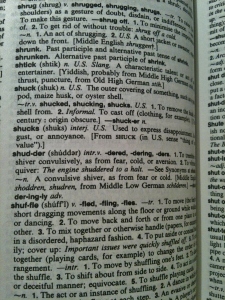BY Vani IN For Writers
My Writing Journey: 101 Lessons I Learnt From My Mistakes (#2 Mistake) [Huffington Post]
Verbosity Doesn’t Make You a Good Writer
Many years ago I told a friend I wanted to be a writer but was scared, I didn’t write like Dickens, nor expressed myself like Keats. ‘Boss,’ he said, ‘you don’t need a great vocabulary to write books. All you need is empathy.’ He was right, and of course, I didn’t listen to him! In 2011, I sat with a dictionary to write the first draft of my book, The Recession Groom, replacing all the words I possibly could with their synonyms. It was a good approach and introduced me to many new words but something was amiss.
First draft over, I showed it to friend number two who had this to say: ‘Vani, you write fine for a while and then all of a sudden a word will be out of whack, not grammatically incorrect, but written with a different rhythm that doesn’t quite fit.’ I was disappointed and kept my draft away for a while to read contemporary authors and found I wasn’t alone. I’d like to quote Jhumpa Lahiri from her novel, The Namesake here: ‘By then she’s dug up the postcards, saved in an unsealed, unmarked manila envelope in the box where she keeps her tax returns, and read them, too, amazed that his words, the sight of his handwriting, still manage to discombobulate her.’ Lahiri is a Pulitzer Prize winning novelist and one of my favourite authors but do you see what I see? Discombobulate? — like really? What about upset, frustrate, befuddle? Would they not have been a better choice?
I think there’s something belittling about small and easy words and that’s what makes us prefer their longer (or literary) versions. I remember a quote from Stephen King’s book, On Writing: A Memoir of the Craft, where he says: ‘one of the really bad things you can do to your writing is to dress up the vocabulary, looking for long words because you’re maybe a little bit ashamed of your short ones. This is like dressing up a household pet in evening clothes. The pet is embarrassed and the person who committed this act of premeditated cuteness should be even more embarrassed.’
My lesson: Verbosity never helps unless you are writing Oxford dictionary and also planning to make your reader sit with one. And, I’m not speaking out of love for colloquialism. All I mean is, don’t make the mistake I made. If you’re planning to write, you already have all the tools in your mind, you’ve just got to pick up whichever is handy. Trust me, you don’t need a dictionary for that!
Quick tips:
- When you think about something, write the first word that comes to your mind. Do away with the need to replace it with synonyms.
- To quote friend number one: You don’t need a great vocabulary to write books. All you need is empathy.
- If you feel discombobulated after reading this post, feel free to leave me a comment. I’d try my best to ameliorate my style of writing.
Next blog: #3 Mistake: Never underestimate an idea
This post is also available to read on The Huffington Post. Click here.

When you think about something, write the first word that comes to your mind. Do away with the need to replace it with synonyms.
Comments are closed.


